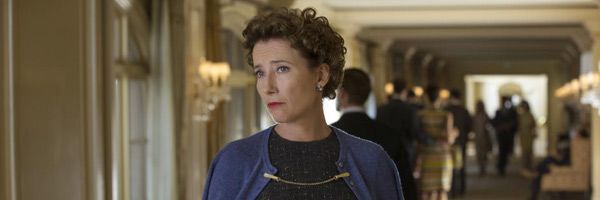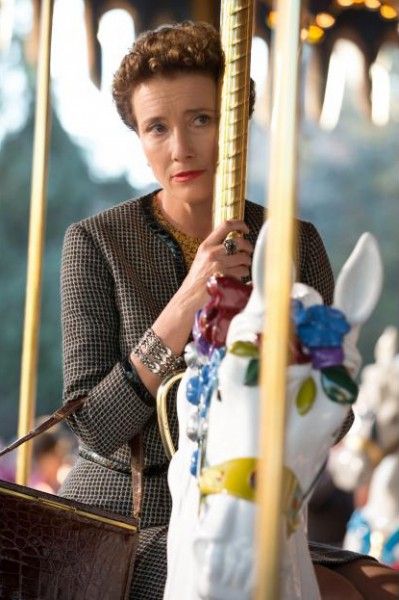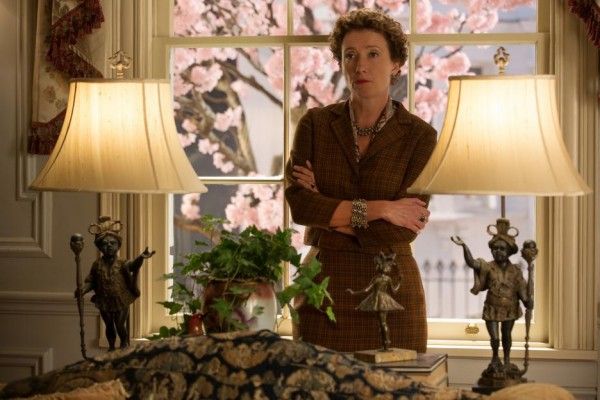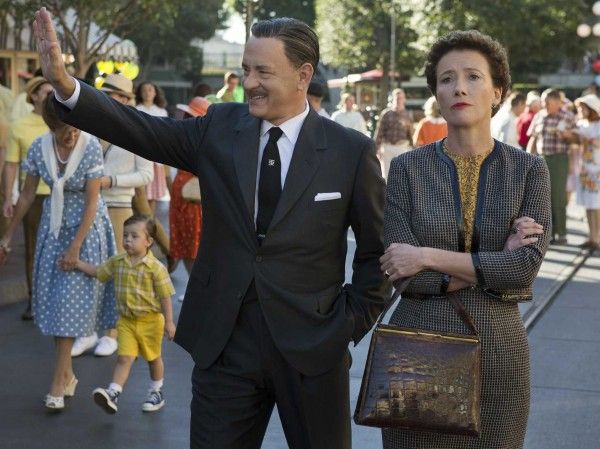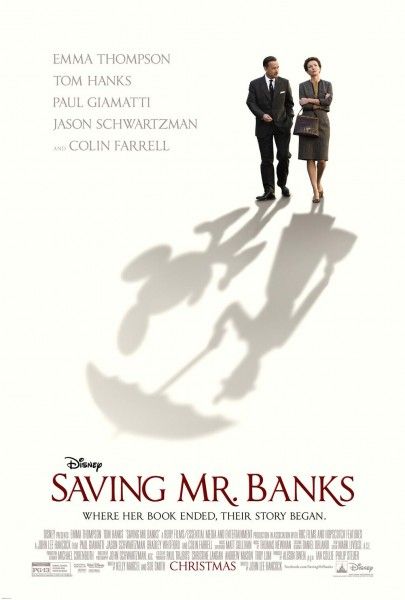Now playing in theaters is Saving Mr. Banks, the new film from The Blind Side director John Lee Hancock. Based on a true story, the pic focuses on Walt Disney’s (Tom Hanks) twenty-year pursuit of the film rights to author P.L. Travers’ (Emma Thompson) novel Mary Poppins and the rocky relationship that formed between the two when she finally came to Hollywood. Loaded with great performances, a strong script, and the first time Walt Disney has been portrayed on screen, Banks is a likely contender for this year’s award season. The film also stars Paul Giamatti, Bradley Whitford, Jason Schwartzman, B.J. Novak, Annie Rose Buckley, Ruth Wilson, Rachel Griffiths, Kathy Baker, and Colin Farrell.
At the recent Los Angeles press day, I landed an exclusive interview with Emma Thompson. She talked about how she got involved in the project, the way she prepared for the role, getting to talk with Mary Poppins songwriter Richard Sherman about P.L. Travers, and more. She also talked about how people always want to talk to her about Nanny McPhee and what it was like to work for Terrence Malick and narrate Voyage of Time.
Collider: Great work in this movie.
EMMA THOMPSON: Thank you.
When you were first approached for this role was it an immediate yes or was there any hesitation?
THOMPSON: Oh, no hesitation at all, because of the script.
So when they approached you they gave you the script and said-
THOMPSON: I think that I saw the script before I was offered anything. I said, “This is such a wonderful script. It’s so beautifully written. This is such an interesting character and I think I could play it quite well, do you think you could go after it for me?” And they did. I mean, John [Lee Hancock] and Kelly [Marcel] tell me that I was who they wanted, but they might be fibbing, you never know.
They’re probably telling you the truth.
THOMPSON: They probably are.
From when you got the script to what people see on screen, did a lot change along the way?
THOMPSON: Oh yes, of course. I had no idea about P.L. Travers. I didn’t know her history. I didn’t know anything about her to be honest. And discovering about her was such an eye opener. At the time I was doing some research into Beatrix Potter and I thought there were these curious connections. She referred to Beatrix Potter as one of the archangels because she was one of the people that she read when she was a child. She was vastly influenced by Potter, who a bit like P.L. was in a sense a sort of polymath. Of course that’s the wrong word because it refers to intellectual accomplishments, but she was like P.L., she did all sorts of things. She was a poet. She wrote essays for magazines about myth. She acted. She was a journalist before becoming a writer, as it were, full time. She made her own living and made her own way and invented herself from a very early age and never relied on a man or anything. She was an extraordinary creature really. I mean, belligerent and difficult though she was, one also as to recognize what an achievement her life and her career were.
Some actors I speak to love getting all the information they can and digesting it all so they sort of have it in their subconscious, while others use some of it. With her you have all these recordings; you almost have too much information. How did you balance how much you wanted to digest?
THOMPSON: Well it’s a matter of time. You’ve got a certain amount of time at your disposal. I could have gone to Australia, but I had just been actually, the year before, so I didn’t feel the need. Listening to those tapes, and I did listen to a lot of them, you kind of get the idea quite quickly. But it’s worth listening to a lot of hours because there are moments when something else comes out of her, which isn’t this- the boys said it was like drowning. Everything they said- she would just flatten them time and time and time again. It must have been so tiring, so exhausting for her.
Did you get to spend a lot of time with [Mary Poppins songwriter] Richard Sherman?
THOMPSON: Oh, yeah.
I would imagine you could almost play her with Richard and he could say, “She would never do that.”
THOMPSON: Yes, he was very, very good. He said, “No it’s uncanny, that’s exactly what it was like- exactly what it was like.” I said, “Did she ever make you laugh? Did she ever crack ever? Did she ever let in a chink of light?” He said, “Not once.” She was horrible to them and he hated her.
I heard.
THOMPSON: So that’s fascinating to me, because Dick is not the sort of person who associates with hating anyone. He’s just such a nice guy. So that really- he was incredibly helpful, because he made me understand quite how relentless she’d been.
Obviously you’re basing things on reality, but you’re making a movie. How much did John and the way you guys made this allow the film to Hollywoodize anything or did you really want to stick to just what happened?
THOMPSON: Well that’s a question for Kelly really, because she was the one was distilling the experience and that process as a writer you see, “Well, what do we need in the story now?” The juxtaposition of two timelines was fascinating to me as well. That was the trick of it. For me it’s not like a film that is set in a particular present with flashbacks. The flashbacks are parallel for me. You experience two storylines at the same time, and I’m not switching from one time to another. I’m allowing those, when I watch it, those two timelines happen in parallel. You know that theory about parallel time. I think that’s how the film works – on me, anyway. I’m experiencing two time zones at the same time and it comes along and it comes along, so I go in to story to story. I don’t think, “Oh now I’m going back in time.” I’d just go, “Yes, now I’m with her here,” and therefore as you approach the end of the film when they sort of come together and fuse that last moment when she’s sitting there watching the movie. I think that is an incredible trick of perspective as it were, time-perspective. If you know what I mean? I can’t explain it any other way…temporal perspective.
I think it does a tremendous job, because you know where it’s going and it does a great job at getting there. It does a really good job. I want to switch onto a few other things. Do more people, when they meet you, want to talk about Harry Potter or Love Actually?
THOMPSON: Well I don’t want to talk about either of those things, so I think that’s the important response to that. I mean Harry Potter, which of course I was very grateful to, because they were wonderful jobs to do, but there was five days here, four days there. Love Actually of course I loved. It’s a three week job.
No, it’s more like a fun question like if you’re in Starbucks, because I would imagine that those are two things that people always want to talk about.
THOMPSON: No, it’s Nanny McPhee.
Really?
THOMPSON: Yeah, yeah, yeah. Harry Potter, I’m very sort of unrecognizable. So children approach me about Nanny McPhee. I’m much more known for that generally speaking. And Love Actually, yes, Love Actually people are very connected to in some emotional way.
I’m very curious as an actor how you have possibly changed the way you prepare for a role and your process as your career has gone on.
THOMPSON: I don’t think I have…changed.
It’s the same routine since the beginning?
THOMPSON: God, I don’t know. I don’t know. I’m not sure. It depends on the role. If there’s a role you’re playing and there’s a great deal of material to explore because the person was real then it’s a completely different preparation time and message to playing someone fictional. I have to say of the Harry Potter role, actually if you stick those glasses and that wig on most people they could have played it. So everything is different. There’s no method if you see what I mean. I’m not a methodologist in that sense, no. I’m not.
Apparently you’re the narrator in the Voyage of Time, is that accurate?
THOMPSON: Mmm.
Have you recorded that stuff?
THOMPSON: I did do a recording about a year and a half ago. I don’t know whether that’s been used yet.
I don’t know if anyone knows.
THOMPSON: No, no one knows. He’s a mystery.
What was it like to work with him and do that?
THOMPSON: I was in a studio in London and he was on just a line in my ear so I wasn’t with him unfortunately.
Was it an interesting recording process or the dialogue?
THOMPSON: Yes, it was. It was very mysterious and it was very free flow as well. He’s a very free kind of guy.
I’m very curious about this.
THOMPSON: Yes.
Very. So did you get to see some of it?
THOMPSON: I’ve only seen a little bit so I’m looking forward to that so much. He’s such an amazing chap.
A very unique filmmaker.
THOMPSON: Yeah.

